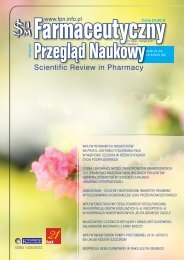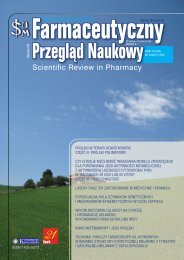Regulamin redagowania pracw „<strong>Farmaceutyczny</strong>m Przeglądzie <strong>Naukowy</strong>m”1. <strong>FPN</strong> zamieszcza prace oryginalne (doświadczalnei kliniczne) oraz poglądowe, z zakresu nauk farmaceutycznych,medycznych i nauk pokrewnych. Ponadto, <strong>FPN</strong>publikuje listy do Redakcji, sprawozdania i materiały zezjazdów naukowych, recenzje książek oraz komunikatyo planowanych kongresach i zjazdach naukowych.2. Manuskrypt w języku polskim należy przesyłać w formieelektronicznej na adres: fpn@kwiecinski.pl (w wyjątkowychprzypadkach na dyskietce 3,5” lub dysku CD-ROM)oraz – w dwóch egzemplarzach wydruku komputerowegona adres Redakcji. Opis dysku powinien zawierać imię inazwisko pierwszego autora i tytuł pracy. Teksty i grafikipowinny tworzyć osobne zbiory. Nie należy umieszczaćrycin i fotografii w plikach tekstowych. Redakcja zalecaużycie edytorów tekstów: Star Office, Word, Word Perfect.Preferowany format dla grafiki to *.TIFF, kolor: CMYK, rozdzielczość300 dpi.3. Prace podlegają ocenie przez recenzentów wyznaczonychkażdorazowo przez Redaktora Naczelnego. Zachęcasię autorów do proponowania nazwisk recenzentów. Redakcjazastrzega sobie prawo dokonywania poprawek iskrótów tekstu (w porozumienia z autorem).4. Do pracy należy dołączyć oświadczenie, że praca niebyła uprzednio publikowana ani nie została wysłana doredakcji innego czasopisma oraz – zgodę Kierownika Jednostki,skąd praca pochodzi, na zamieszczenie publikacjiw czasopiśmie.5. 5Wszystkie badania prowadzone na ludziach lub zwierzętach,które są przedmiotem pracy naukowej, opisanejw manuskrypcie, muszą mieć akceptację, odpowiednio,Komisji Bioetycznej lub Etycznej.6. Przesłane materiały wraz z recenzją pozostają w dokumentacjiredakcji.7. Wydawca nabywa na zasadzie wyłączności ogół prawautorskich do wydrukowanych prac (w tym prawo dowydania drukiem, na nośnikach elektronicznych CD i innychoraz w Internecie). Dopuszcza się natomiast drukowaniestreszczeń bez zgody Wydawcy.8. Instrukcja dla autorów8.1.5Maszynopis powinien być drukowany jednostronniena białym papierze formatu A4, z zachowaniem podwójnegoodstępu między wierszami oraz marginesem2,5 cm.5 8.2.5Strona tytułowa powinna zawierać: tytuł lub stopieńnaukowy, imię i nazwisko (imiona i nazwiska) autoróww pełnym brzmieniu, tytuł pracy w języku polskim iangielskim, nazwę placówki naukowej, oraz tytuł lubstopień naukowy, imię i nazwisko kierownika placówkinaukowej, skąd pochodzi praca. U dołu strony należypodać imię i nazwisko oraz adres, telefon i e-mail autoraodpowiedzialnego za korespondencję, dotyczącąmanuskryptu.8.3.5Druga strona manuskryptu powinna zawieraćstreszczenie (150-250 słów w języku polskim i angielskim),w którym należy podać krótkie wprowadzenie, cel badania,podstawowe procedury (wybór badanych osób lubzwierząt doświadczalnych, metody badań), główne wynikioraz wnioski. Pod streszczeniem należy umieścić słowakluczowe w języku polskim i angielskim, zgodnie z MedicalSubject Headings Index Medicus8.4. Oryginalne prace powinny być podzielone narozdziały, według schematu: wstęp, materiał i metody,wyniki badań, dyskusja oraz wnioski.8.5.5Piśmiennictwo powinno być ułożone wg kolejnościcytowania w tekście pracy. Skróty tytułów czasopismpowinny być zgodne z Index Medicus. Każda pozycja– pisana od nowego wiersza, powinna być opatrzona<strong>numer</strong>em oraz zredagowana zgodnie z niżej podanymprzykładem:· czasopismo naukowe:Varga J, Abraham D. Systemic sclerosis: a prototypicmultisystem fibrotic disorder.J Clin Invest 2007; 117: 557-67.Jeżeli autorów jest więcej niż trzech, wówczas należypodać nazwisko pierwszego z nich, z dopiskiem „i wsp.”.Komosińska-Vassev K i wsp.: Graves’ disease-associatedchanges in the serum lysosomal glycosidases activityand the glycosaminoglycan content. Clin Chim Acta 2003;331: 97-102.· wydawnictwo zbiorowe:Rodwell VW. Białka: struktura i właściwości. W: BiochemiaHarpera. Red. Murray RK i wsp. WydawnictwoLekarskie PZWL. Warszawa 1994, 59-69.· monografia:Bańkowski E. Biochemia. Urban & Partner. Wrocław 2004.Powołania w tekście, umieszczone w nawiasachkwadratowych, powinny być oznaczone cyframi arabskimi.Liczbę pozycji piśmiennictwa należy ograniczyć:w pracach oryginalnych do 20 pozycji, w poglądowychdo 30 i w pozostałych do 10.8.6. Ryciny (wykresy, rysunki, fotografie czarno-białei kolorowe) powinny być umieszczone w osobnej kopercie,po<strong>numer</strong>owane, opatrzone nazwiskiem autorai tytułem pracy, z zaznaczeniem „góra”, „dół”. Opisy rycinnależy podać na oddzielnej stronie z <strong>numer</strong>ami ilustracjipodanymi cyframi arabskimi. Materiały ilustracyjne, poprzedniopublikowane, należy zaopatrzyć w pisemną zgodęWydawcy na ponowną publikację.8.7. Tabele, umieszczone każda na osobnej stronie,należy po<strong>numer</strong>ować cyframi rzymskimi i opatrzyć tytułamiumieszczonymi nad tabelą. Opisy tabel należy podać naoddzielnej stronie z <strong>numer</strong>ami tabel, podanymi cyframirzymskimi.8.8. Zalecana objętość pracy oryginalnej i poglądowejwynosi 10, pozostałych – 5 stron.Adres Redakcji:<strong>Farmaceutyczny</strong> Przegląd <strong>Naukowy</strong>41-200 Sosnowiecul. Jedności 8Tel. 500 722 219e-mail: fpn@kwiecinski.pl58 <strong>Farmaceutyczny</strong>Przegląd <strong>Naukowy</strong>copyright © 2008 Grupa dr. A. R. KwiecińskiegoISSN 1425-5073
Nr 7-8 / 2008English for Pharmacists,czyli jak przygotować się do egzaminu z języka angielskiego,który wymagany jest do specjalizacji.Read the text and complete the activities which follow:VirusesA virus (from the Latin virus meaning „toxin” or „poison”), is a sub-microscopic infectious agentthat is unable to grow or reproduce outside a host cell. Each viral particle, or virion, consists ofgenetic material, DNA or RNA, within a protective protein coat called a capsid or an envelope.Biologists debate whether or not viruses are living organisms. Some consider them non-living as they do notmeet the criteria of the definition of life. For example, unlike most organisms, viruses do not have cells. However,viruses have genes and evolve by natural selection. Others have described them as organisms at the edge of life.Viruses infect cellular life forms and are grouped into animal, plant and bacterial types, according to the type of hostinfected. Viral infections in human and animal hosts usually result in an immune response and disease. Often, a virusis completely eliminated by the immune system. Antibiotics have no effect on viruses, but antiviral drugs have beendeveloped to treat life-threatening infections. Vaccines that produce lifelong immunity can prevent viral infections.WORDS:poison – truciznaagent – czynnikdebate – rozważać, debatowaćto meet criteria – spełniać kryteriaevolve – rozwijać się; wytwarzać; powstawaćat the edge of life – na krawędzi życiahost – biol. żywiciel ; gospodarzresult in sth. – dać/przynieść w rezultacie coś, skutkować czymśdevelop – tutaj opracowaćlife-threatening – zagrażający życiuvaccine – szczepionkalifelong immunity – odporność na całe życieprevent – zapobiegaćTASKS:I.II.III.IV.V.In the text find all the words and phrases you don’t understand. Use your dictionary and translate them.Look up their pronunciation in the dictionary.Read the text aloud.Decide which of these statements are true (T) or false (F).1. Viruses grow or reproduce outside a host cell.2. Biologists are quite sure that viruses are living organisms.3. Alike most organisms, viruses do not have cells.4. Some vaccines produce lifelong immunity and can protect against viral infections.Translate the text into Polish.Ask for the underlined parts of the following sentences:1. Viruses are sub-microscopic infectious agents that are unable to grow or reproduce outside a hostcell.2. Biologists debate whether or not viruses are living organisms.3. Antibiotics have no effect on viruses.4. Viruses infect cellular life forms.Look for the answers on this page.Drodzy Czytelnicy!Równolegle do English Booster Dose, przygotowałyśmy inny cykl spotkań z językiem angielskim, English for Pharmacists.W cyklu tym, wykorzystując wieloletnie doświadczenie Anny W. Kierczak, jako egzaminatora specjalistycznego językaangielskiego, pragniemy pomóc Państwu przygotować się do egzaminu z języka wymaganego do specjalizacji. Prosimyo nadsyłanie Waszych opinii, uwag i sugestii.E-mail: engcent@slam.katowice.plAdres: Studium Języków Obcych Wydziału Farmaceutycznego z Oddziałem Medycyny Laboratoryjnej, ŚUM; ul.Ostrogórska 30, 41-200 Sosnowiec.Anna W. Kierczak i Agata SitkoAnswers:Task III:1.F; 2.F; 3.F; 4.T.Task VPossible questions:1. What are viruses?2. Who debates whether or not viruses are living organisms?3. What doesn’t have any effects on viruses?4. What do viruses infect?copyright © 2008 Grupa dr. A. R. KwiecińskiegoISSN 1425-5073<strong>Farmaceutyczny</strong>Przegląd <strong>Naukowy</strong>59
















